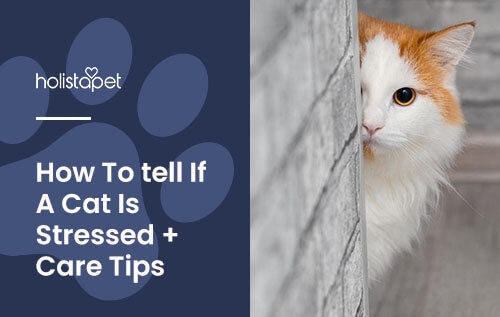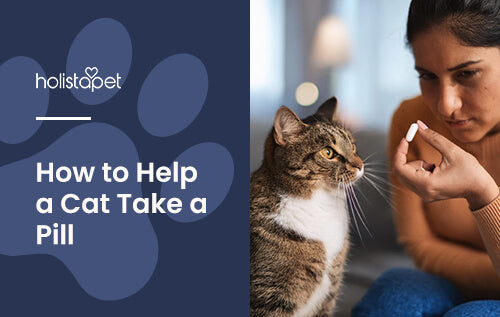Your kitty's behavior might be telling you something. They may be showing signs of stress in cats and you're wondering what to do. Don't worry, we're here to help.
When cats feel stressed, their mental and physical health can suffer. Their distress can lead to various issues, and no cat parent would want that. Recognizing the common signs and being proactive can make all the difference.
In this guide, we'll explore what causes a cat's stress levels to rise and how can you can make them feel secure no matter what. Keep reading for helpful insights and possible solutions to your feline friend's frustrations.
Identifying the Signs of Stress in Cats

Recognizing the signs of stress in cats early can help keep more severe issues at bay. By quickly spotting stress indicators, pet owners can find the root cause and take immediate action.
Plus, understanding your cat's disposition can help strengthen your bond. You can correctly respond to their specific needs, giving them the best care possible.
Is Stress in Cats Common?
Yes, stress in cats is quite common. Many cats experience distress due to various reasons. Stress triggers can include changes in their daily routine, environment, or the introduction of a new family member. Understanding that stress is a natural feline response to these factors can help pet owners act with more empathy and readiness.
Related Post: Is My Cat Depressed? Signs + Helpful Suggestions
Spotting the Signs of Stress in Cats
Spotting the common signs of stress in your cat involves observing their behavior, body language, and overall health. This can be a challenge at times because most cats are prone to hiding signs of anxiousness. Nonetheless, there are some red flags that can point to a cat experiencing stress. Let's talk about them in the next sections.
Cat Behavior Symptoms of Stress
Behavioral symptoms of stress can manifest in different ways. When feeling stressed, a cat may:
- Become More Aggressive or Withdrawn
- Show a Big Change in Their Usual Demeanor
- Avoid Socializing and Find a Hiding Place
- Eat Less or Eat Way Too Much
- Excessively Groom or Neglect Grooming Altogether
These changes in your cat's behavior can mean that something is agitating them. If you notice any of these indicators, it may be time for a veterinary visit.
Cat Body Language Symptoms of Stress
Pay attention to your kitty's body language. When your cat is stressed, they may show the following:
- Flattened Ears
- Tucked Tail
- Crouching With a Low Body Posture
- Dilated Pupils
- Stiff, Tense Body
- Excessive Scratching or Grooming in a Specific Area
By observing physical clues, you can better help your pet. Consult your vet if your cat shows these indicators.
Cat Health Symptoms of Stress
Health symptoms in cats need solutions quickly. When a cat feels stressed and physically unwell, they may exhibit:
- Digestive Issues (Upset Stomach or Queasiness)
- Decrease in Appetite (Leading to Weight Loss)
- Frequent Infections or Illnesses
- Signs of Discomfort or Muscle Tension
If you notice these changes in your cat's physical health, consult your veterinarian, stat. They can help figure out what's wrong with your furry friend.
What Are the Causes of Stress in Cats?
Common causes of feline stress include changes in their environment, unfamiliar cats intruding into their space, or disruptions in their routine. Recognizing these triggers can help you take the right steps to reduce stress in your cat. Let's look at these specific causes and more in the next sections.
Lacking Key Resources
Cats need specific things to feel comfortable. A lack of key resources such as food, water, and litter boxes can cause distress.
Make sure your cat has access to clean water bowls and food bowls at all times. If you have two or more cats, make sure to have enough litter trays around the house. Kitties also need hiding places and scratching posts. Giving all the resources they need can help them feel safe and happy.
Territorial Threats

Felines can feel threatened when unfamiliar cats enter their space. Since cats are naturally territorial, any perceived threat to their domain can agitate them.
Implement changes to your cat's living situation with care. For example, gradually introduce new animals to help your cat adjust and feel more at ease in their environment.
Living With Other Cats or Pets
The presence of other pets in the home might lead to competition for resources. Also, the arrival of a new pet can disrupt the existing hierarchy and routine in your home. All these can cause your domestic cat to feel anxious and agitated.
Make sure all your furry friends have enough space and resources. This can help reduce tension and promote harmony in your multi-pet household.
Location or Environment Changes
Moving houses, rearranging furniture, or even a new scent can upset cats. Felines are creatures of habit, and any changes in their familiar environment can be distressing.
Introduce new environments gradually. Provide your cat with familiar objects like their favorite blanket or toy to help them feel more secure. Maintaining a consistent routine can also help ease the transition.
Overhandling of Cats
While some cats prefer cuddling, others may find it overwhelming. If your cat is feeling stressed from overhandling, they may try to escape, flatten their ears, or swish their tail. Pay attention to their body language and respect their boundaries.
Give your cat space and allow them to approach you on their terms. Doing so can create a safe and comfortable environment, possibly reducing stress and building trust.
Changes in Your Routine
We've mentioned that cats thrive on predictability. So, sudden changes in feeding times, play schedules, or even your schedule can cause them additional stress. They may start to exhibit nervous behaviors or become more withdrawn.
Try to keep your and your cat's routine as consistent as possible. If changes are unavoidable, switch things up slowly. Also, give your cat extra attention and reassurance to help them feel better.
Unfamiliar Guests
You may notice your feline friend feeling stressed whenever you have guests visiting. Cats may feel threatened or anxious whenever new people enter their territory. They may hide, refuse to eat, or show other signs of stress.
Have a safe space where your cat can retreat when guests are over. Allow your kitty to approach new people at their own pace. Also, advise your guests to avoid forcing interactions.
Separation Anxiety

When left alone for long periods, some cats may feel anxious or upset. They may exhibit destructive behaviors or excessive vocalization.
Make sure your cat has plenty of toys and a comfortable space. Get your furry friend used to being alone by starting with short absences and gradually increasing the duration. A consistent routine and plenty of affection when you are home can also help.
New Baby
The sights, sounds, and smells of a new baby in the house can overwhelm cats. Additionally, the shift in attention and routine can cause felines to feel insecure.
Slowly introduce your cat to the new baby. Allow your furry friend to explore the baby's room and become familiar with the new scents. Also, maintain your cat's routine as much as possible and give them extra attention to help reduce stress during the transition.
Suggestions To Ease Cat Stress
There are many approaches to helping ease cat stress. They require your care and patience to succeed. In the next sections, we'll discuss suggestions to help reduce your cat's stress effectively. Let's begin.
Seeing a Vet
Regular checkups can keep your cat's physical health in check, helping prevent stress-related illnesses. Your vet can rule out any underlying health issues that might be agitating your cat. Your vet can also give expert advice on managing your pet's anxious behaviors.
Provide a Safe, Clean, and Calm Environment
Ensure your cat has a quiet space where they can retreat and feel secure. This area should be free from loud noises and disturbances. Also, regularly clean their litter box, food bowl, and water bowl. Plus, provide them with comfortable bedding and familiar items like toys to create a calming atmosphere.
Can CBD Help Calm a Stressed Cat?
Yes, CBD (cannabidiol) may help comfort a stressed cat. CBD interacts with cats' endocannabinoid system (ECS), which plays a role in regulating their mood and stress responses. Many pet owners have found that CBD products can promote relaxation and calmness in their cats.
HolistaPet offers a range of calming CBD cat products. We have CBD Oils, CBD Hard Treats, and Calming CBD Soft Chews. These products use broad-spectrum CBD, which doesn't have THC (tetrahydrocannabinol), the mind-altering compound in cannabis. Our products have been third-party lab-tested and vet-approved to ensure your kitty's safety and well-being.
Spend Time With Your Cat
Spending quality time with your cat can do wonders for their mood. Regular play sessions can help mentally and physically stimulate them. Use interactive toys and activities to engage your cat and create a stronger bond with them.
Also, gentle petting and grooming sessions can bring your kitty comfort and reassurance. Pay attention to your their preferences and allow them to approach you on their terms. Doing so can foster a trusting relationship.
When To See an Animal Behaviorist
Consult an animal behaviorist if your cat's stress persists despite your efforts. These experts specialize in modifying problematic behaviors in pets. They can provide tailored solutions to address your cat's issues.
You can work together to create a plan for your cat. This plan can include environmental changes, behavior modification techniques, and wellness products (like HolistaPet's calming CBD offerings). With expert help, your kitty can receive the best care and support.
Final Thoughts - Signs of Stress in Cats
Now that you know the usual red flags and common reasons for stress in cats, you can make better choices for your feline friend. Keep our suggested solutions in mind for the next time your kitty exhibits distress. For extra support, consider our calming CBD cat products.
With the right know-how and a lot of empathy for your cat, you can help protect their physical and mental state. Enjoy worry-free days and see your kitty live their best life!







![Probiotics For Dogs [Soft Chews] - HolistaPet](http://www.holistapet.com/cdn/shop/files/Probiotic-Infographic-1_472d7a29-e30c-435a-9638-1365d8c3a9f9.jpg?v=1725384841&width=104)




























1 comment
Virginia Brown
Thank you.
Leave a comment
All comments are moderated before being published.
This site is protected by hCaptcha and the hCaptcha Privacy Policy and Terms of Service apply.